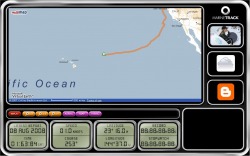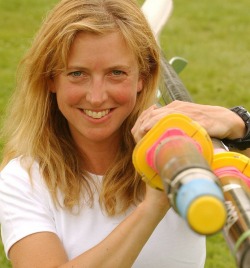
All summer, I have been listening to a really remarkable podcast - Roz Rows the Pacific.
A woman named Roz Savage, who rowed solo across the Atlantic Ocean a couple of years ago is currently rowing across the Pacific Ocean. If she succeeds, she'll be the first woman to do this. Her trip will be in three legs - San Francisco to Hawaii, Hawaii to Tuvalu and Tuvalu to Australia. Because she will obviously need to rest up between the legs of this trip, it will take a couple of years.
As I write this, she is a little less than a thousand miles from Hawaii - almost done with the first leg of the trip.
Because modern technology like satelite phones, gps units and the internet have all come down so much in price over the past few years, it is very easy to keep up with her progress. She has:
· A podcast that is updated three times a week, where Roz tells what happened to her at sea over the past few days. This is strangely compelling, especially considering that NOTHING much happens on a day-to-day basis: just rowing, rowing and maybe some more rowing (on most days, she doesn't even see birds). The more you listen to this, though, the more you end up thinking about her very tiny environment.
For instance, a few weeks into her trip, her watermaker broke down totally and completely; it will have to be replaced when she gets to Hawaii. It's not a trip-ending disaster; most of her ballast is made up of bags of fresh water, so she can drink her ballast throughout her trip, replacing it with sea water as she goes. This just means that she has to carefully consider each and every drop of water she uses. (Given that she rows twelve to fifteen hours a day, that is a very tricky balance to strike.)
· A blog - She updates a blog about once a day. (Again, fascinating in a zen kind of way - looking at the tiny details of her life at sea.)

· A marine tracking website that updates her position, speed and course every day

So, how does this relate to the classroom?
Hard to tell. If everything goes well, Roz will finish up the first leg of her trip sometime in early September - a little too early to make a viable class project out of this. She should start the second leg of the voyage next winter, which would give a teacher plenty of time to plan a good project around this.
Here are a few possible activities I see:
· Giving her latitude and longitude coordinates to students each morning and having them track her progress on a big classroom map. At the end of a particular period of time, this could be compared to the map generated by MarineTrack, the website that provides the coordinates.
· Mocking up a floorplan of her boat and planning out packing lists (sort of like the "What would you take with you in a covered wagon?" activity that many of us have used over the years.)
· Writing letters or emails as a class. One of the main reasons Roz is making this trip is to raise awareness of ocean conservation. There are some great writing assignments in there somewhere.
· Converting nautical miles to statute miles, knots to miles per hour, metric to imperial measurements, etc...
· Studying currents, prevailing winds, tides, storms and other weather systems.
· Learning just where the heck Tuvalu is and studying the history and geography of the islands of the South Pacific.
These strike me as really good projects for 4th-7th grades. (I suspect our 8th graders could never get past the idea of her going a couple of months without washing her hair or shaving her legs.)
 RSS Feed
RSS Feed